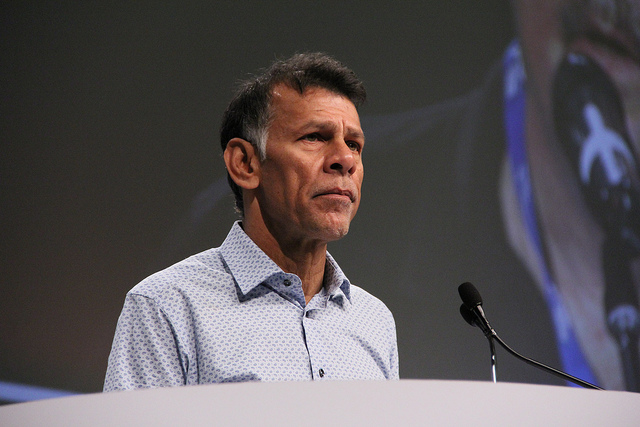Please support our coverage of democratic movements and become a monthly supporter of rabble.ca.
With all the election attention — Toronto mayor, Ontario provincial, federal byelections — you may have missed a good one: the Canadian Labour Congress dogfight three weeks ago. Former autoworker Hassan Yussuff took on 15-year president Ken Georgetti, who’d already been challenged by outsider Hassan Husseini — the names alone are notable, they recall another upstart candidate: Barack Hussein Obama. No, Toto, this definitely isn’t Kansas anymore. Husseini dramatically withdrew to support the other Hassan (Yussuff) who won by 40 votes out of 4,600. C’mon, that’s a story, at least as much as the well-known conflicts at the Assembly of First Nations. Yet it was scarcely covered.
Forty years ago, news outlets had full-time labour reporters the way they now assign someone full-time to the Raptors. They still tell union stories but they rarely consult actual union people. It’s like the way U.S. media analyze Afghanistan: by interviewing American experts and ex-diplomats at think-tanks in Washington rather than Afghans. Even the Wikipedia entry on the Canadian Labour Congress is scrawny — not that I rely on Wikipedia, ever.
Yussuff had been on the CLC executive as long as Georgetti. He could have comfortably stayed, along with two women vice-presidents, one of them black. Together they provided a kind of diversity window dressing for the still mainly male/white leadership of the movement. Instead they all broke from the “slate” and ran independently, a massive taboo in high union politics where top-down control is routine. It was the first successful challenge to a CLC president ever.
So who is he? Yussuff came from Guyana at 16, missed his pals back home, took college courses in truck mechanics, got a job at a CAW plant, partied on weekends with the good money he made, happened to attend a union meeting — and was intrigued. He became involved, helped some older workers get the pay they deserved despite provincial bureaucratic obstacles — and liked how it felt. Who knows why? Helping others just turns some people’s crank. What’s clear is that he’s another case of someone with natural leadership ability who’d likely never have known it or done anything with it if there were no unions.
In the aftermath of Sept. 11, when he was a CLC exec member, he sometimes complained about being pulled from airport lines for special screening. He did look a bit like Hollywood’s stereotypical idea of a terrorist, though he totally lacks the mandatory fanatical eye-glint. In fact, his manner is entirely calm and measured: no starchy old-style union rhetoric, though still a slight Caribbean lilt. He’s utterly undefensive about labour’s failings and challenges, like the absence of a public presence or disillusionment among some members.
What he asks in that calm tone is whether unions can recapture issues of dignity, standing up, having a voice for both traditional workforces and the new “precariat.” He admires U.S. teachers’ unions for resisting standardized tests in place of real education and fighting to keep local schools. That’s the kind of “social unionism” he learned in the CAW. It’s not just, or mainly, a matter of supporting candidates in elections, though it’s sometimes reduced to that. It’s looking out for the interests of members as “whole human beings.” Union in the sense of the unity of human lives. “We’re complete people, we’re not simply individuals who say, OK, what can you do to increase my wages and ignore all other issues that affect me?” When PC Leader Tim Hudak rails against union dues being used “politically,” that’s what’s at stake: the complex unity of life with work.
An aside on race: Hudak’s right-wing U.S. economist, Benjamin Zycher, who so hilariously botched the math in his “million jobs” promise, is also on record saying Michelle Obama wouldn’t have had her senior thesis accepted at Princeton if she weren’t black. I don’t know who decides that you get away with that stuff or why Hudak hasn’t repudiated it from the guy he employed.
And speaking of employment, who cares more about jobs than unions? Without them, unions wouldn’t exist. So if Hudak is focused on jobs and only jobs, why doesn’t he work with unions and not attack them? I know the thought is ridiculous but the question isn’t stupid. Something doesn’t compute here.
This article was first published in the Toronto Star.
Photo: United Steelworkers/flickr




